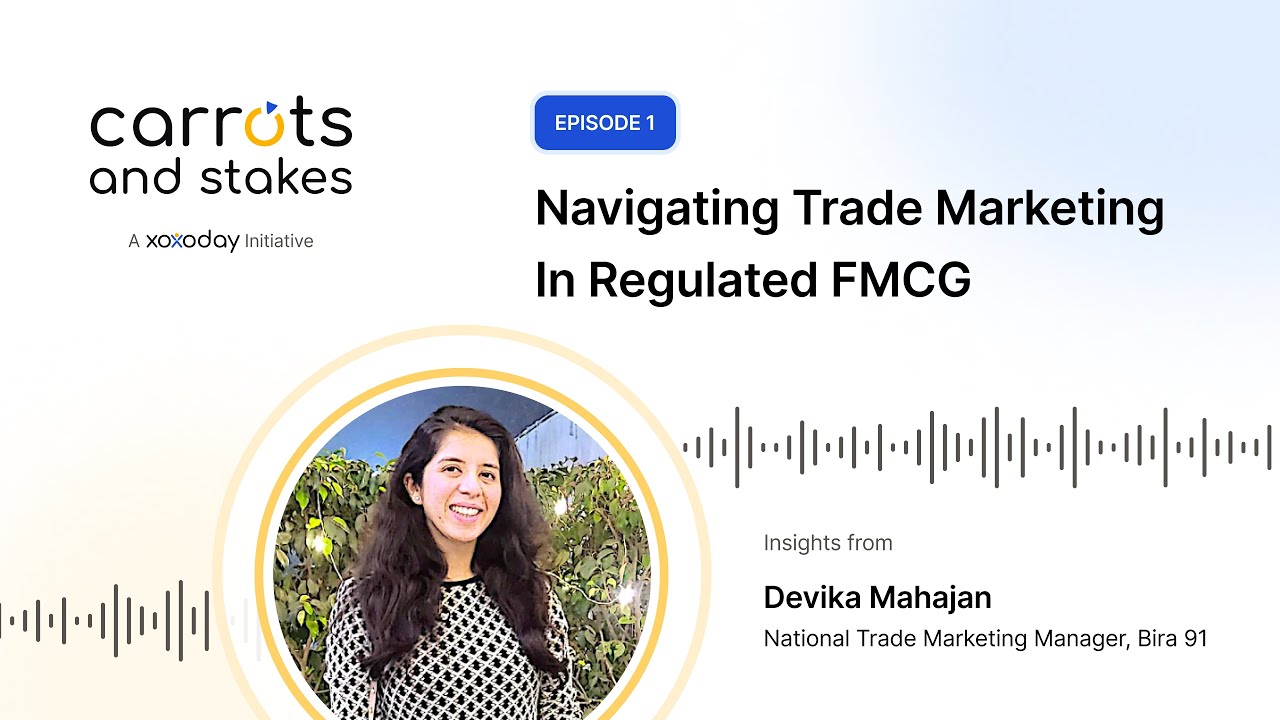Seni Pemasaran Perdagangan | Wawasan dari Devika Mahajan
Perkenalan
DJ: Halo semuanya, nama saya DJ, dan selamat datang di seri podcast ini yang berjudul Carrots and Stakes. Dalam seri ini, saya akan mewawancarai para pemimpin pemasaran perdagangan untuk belajar dari pengalaman mereka dan mendengarkan kisah mereka tentang membangun merek-merek teratas di India.
Hari ini, saya didampingi oleh DEVIKA Mahajan, yang memiliki pengalaman luas dalam pemasaran perdagangan dengan merek-merek seperti Diageo dan Bira 91. Dia hadir untuk berbagi wawasan tentang praktik terbaik dan perjalanan karirnya di industri ini. Selamat datang, DEVIKA!
DEVIKA: Terima kasih, DJ. Senang bisa berada di sini.
DJ: Bagaimana kabarmu hari ini?
DEVIKA: Aku baik-baik saja—merasa excited dan sedikit gugup!
DJ: Apakah kita mulai?
DEVIKA: Tentu saja!
Membangun Hubungan yang Kuat di Industri yang Teratur
DJ: Hari ini, kita akan fokus pada industri yang diatur, yang mencakup sektor seperti tembakau dan alkohol. Pertanyaan pertama saya adalah tentang membangun hubungan yang kuat dengan mitra saluran seperti distributor dan pengecer. Berdasarkan pengalaman Anda, apa saja elemen-elemen kritis yang paling penting dalam kemitraan yang sukses di industri yang diatur seperti alkohol?
DEVIKA: Kepercayaan dan keselarasan etika sangat penting saat bekerja dengan distributor, pengecer, dan grosir. Saluran komunikasi yang efektif juga sangat krusial. Kita perlu berbagi informasi real-time dengan mitra kita agar mereka memahami perubahan perilaku konsumen, norma regulasi baru, dan rencana pemasaran perdagangan kami.
Pengelolaan krisis kolaboratif merupakan aspek penting lainnya. Misalnya, jika terjadi perubahan mendadak dalam kebijakan pemerintah atau strategi pemasaran, kita perlu bekerja sama dengan mitra kita untuk merancang rencana alternatif.
Selain itu, kami mengadakan sesi pelatihan untuk grosir, distributor, dan pengecer agar mereka memiliki pemahaman yang mendalam tentang produk kami. Pengecer adalah influencer kami di pasar ini. Ketika mereka memiliki pengetahuan yang cukup, mereka dapat mempromosikan produk kami secara efektif kepada konsumen.
Kami juga menyelaraskan tujuan dan memberikan insentif kepada pengecer melalui rencana bisnis bersama. Rencana-rencana ini memastikan situasi saling menguntungkan bagi perusahaan dan pengecer. Misalnya, kami mungkin menjalankan kampanye di mana pengecer menginvestasikan waktu dan sumber daya, dan sebagai imbalannya, kami menawarkan promosi atau aktivasi untuk meningkatkan penjualan.
Bertahan dan Berkembang di Ruang Rak yang Terbatas
DJ: Ruang rak selalu terbatas, dan persaingan sangat ketat. Apa saja cara efektif yang dapat dilakukan oleh sebuah merek untuk bertahan dan berkembang tanpa harus terjun ke pemasaran langsung, terutama di industri yang diatur seperti industri alkohol?
DEVIKA: Iklan langsung minuman beralkohol dilarang di India, sehingga merek-merek sangat bergantung pada diferensiasi produk. Misalnya, kemasan memainkan peran yang sangat besar. Ambil contoh Woodsman
Scotch—memiliki desain botol unik dengan puncak gunung di dalamnya. Contoh lain adalah Hapusa Gin, yang berwarna ungu, berbeda dengan kebanyakan gin.
Merek juga fokus pada pemasaran pengalaman. Misalnya, festival musik Bacardi’s 7 Weekender menciptakan warisan acara pengalaman yang resonan dengan generasi milenial. Demikian pula, Tuborg dan Corona memanfaatkan suara membuka tutup botol dalam kampanye pemasaran mereka.
Strategi kecil namun berdampak ini membantu merek membangun koneksi dengan konsumen tanpa iklan langsung.
Program Loyalitas dan Insentif untuk Pelanggan
DJ: Bagaimana merek menarik pelanggan ke toko ritel? Apakah ada program loyalitas atau alat khusus untuk memotivasi rantai pasokan?
DEVIKA: Di kota-kota metropolitan, kami fokus pada promosi dan edukasi konsumen tentang produk. Misalnya, aplikasi seperti Make Play memungkinkan pengguna untuk memindai tutup botol dan mendapatkan poin untuk hadiah.
Di kota-kota tier 2 dan tier 3, kami memberikan insentif kepada pemilik toko melalui program insentif manajer toko (CSM). Kami juga menawarkan paket bundling atau penawaran hadiah saat pembelian. Misalnya, membeli satu dus minuman keras bisa disertai dengan gelas gratis atau alat bar. Di daerah pedesaan, kami menggabungkan minuman keras dengan paket camilan, karena konsumen sering minum di tempat.
Menempatkan Merek Premium untuk Acara-Acara
DJ: Bagaimana merek premium menempatkan diri mereka untuk acara khusus atau pemberian hadiah, terutama di pasar di mana konsumen mungkin tidak secara rutin membeli produk premium?
DEVIKA: Merek premium menargetkan nilai aspiratif. Misalnya, Johnny Walker mengadakan acara degustasi eksklusif dan pemasangan makanan untuk kelompok terpilih influencer, selebriti, dan pelanggan setia. Acara-acara ini menciptakan kredibilitas dari mulut ke mulut di kalangan niche.
Merek juga memanfaatkan budaya pop. Misalnya, Macallan mengalami lonjakan popularitas setelah muncul dalam serial TV Suits. Strategi pemasaran semacam ini memastikan bahwa merek premium tetap menjadi simbol aspirasi dan eksklusif.
Peran Data dalam Industri Minuman Beralkohol
DJ: Bagaimana data berperan dalam rantai pasok yang kompleks dan teratur seperti ini?
DEVIKA: Pengumpulan data konsumen menantang karena regulasi, jadi kami mengandalkan data penjualan dan wawasan pembeli. Alat seperti Salesforce membantu kami melacak volume penjualan dan menganalisis kinerja sebelum dan setelah aktivasi.
Di negara-negara dengan pasar yang dikendalikan oleh pemerintah, data lebih transparan. Namun, di pasar distributor atau grosir, kami bergantung pada masukan dari mitra. Membangun kepercayaan dengan mitra-mitra ini sangat penting untuk pengumpulan data yang akurat dan peramalan.
Masa Depan Industri Alkohol
DJ: Apa yang akan terjadi di masa depan bagi industri minuman beralkohol, dan tren apa saja yang telah muncul dalam dekade terakhir?
DEVIKA: Secara global, industri alkohol bernilai 2,3 triliun dolar, dengan India sebagai konsumen terbesar Scotch. Pada tahun 2030, pasar alkohol India diperkirakan akan tumbuh menjadi 2,3 triliun dolar, dengan India tetap menjadi konsumen terbesar Scotch. Pada tahun 2030, pasar alkohol India diperkirakan akan tumbuh menjadi 64 miliar dolar.
Norma-norma regulasi akan terus diperketat. Misalnya, pemasaran pengganti telah digantikan oleh perluasan merek seperti Black & White Ginger Ale dan Johnny Walker Soda. Produk-produk ini harus mematuhi pedoman ketat, seperti menggunakan font dan warna yang berbeda dari merek induk.
Di masa depan, kita akan melihat lebih banyak transparansi dan pengambilan keputusan yang didasarkan pada data, baik bagi merek maupun pemerintah.
Sambutan Penutup
DJ: Terima kasih, DEVIKA, atas wawasan dan pengalaman yang Anda bagikan. Senang sekali bisa memiliki Anda di podcast ini.
DEVIKA: Terima kasih, DJ. Aku sangat menikmati waktuku. Seperti yang dikatakan Johnny Walker, “Teruslah berjalan!”
DJ: Tentu saja! Terima kasih kepada semua pendengar yang telah menyimak. Tetaplah menyimak untuk episode-episode selanjutnya dari Carrots and Stakes.

Episode terbaru
Dapatkan pemberitahuan setiap kali kami memposting episode baru

Berlangganan sekarang dan dapatkan pembaruan instan setiap kali ada episode baru.












.jpg)




.jpg)
